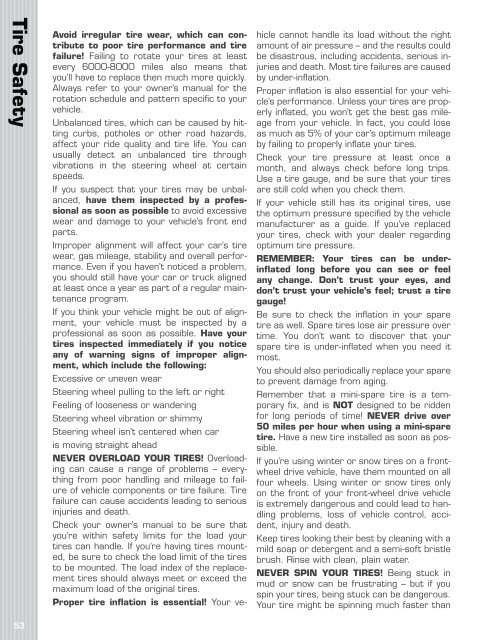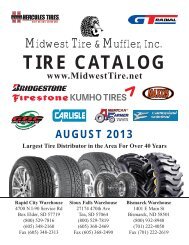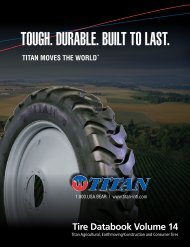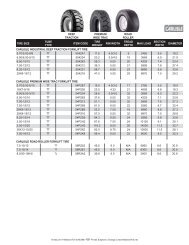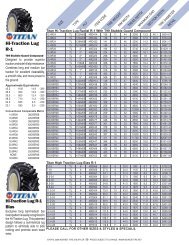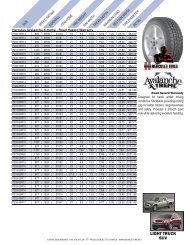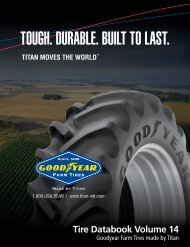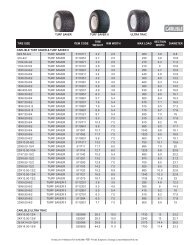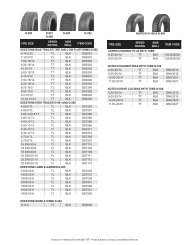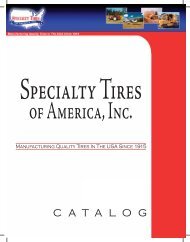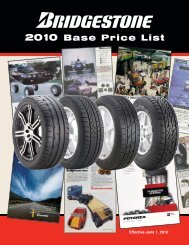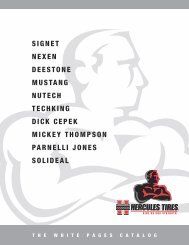2010 AUTOMOTIVE TIRE CATALOG
2010 AUTOMOTIVE TIRE CATALOG
2010 AUTOMOTIVE TIRE CATALOG
You also want an ePaper? Increase the reach of your titles
YUMPU automatically turns print PDFs into web optimized ePapers that Google loves.
Tire Safety<br />
Avoid irregular tire wear, which can contribute<br />
to poor tire performance and tire<br />
failure! Failing to rotate your tires at least<br />
every 6000-8000 miles also means that<br />
you’ll have to replace then much more quickly.<br />
Always refer to your owner’s manual for the<br />
rotation schedule and pattern specific to your<br />
vehicle.<br />
Unbalanced tires, which can be caused by hitting<br />
curbs, potholes or other road hazards,<br />
affect your ride quality and tire life. You can<br />
usually detect an unbalanced tire through<br />
vibrations in the steering wheel at certain<br />
speeds.<br />
If you suspect that your tires may be unbalanced,<br />
have them inspected by a professional<br />
as soon as possible to avoid excessive<br />
wear and damage to your vehicle’s front end<br />
parts.<br />
Improper alignment will affect your car’s tire<br />
wear, gas mileage, stability and overall performance.<br />
Even if you haven’t noticed a problem,<br />
you should still have your car or truck aligned<br />
at least once a year as part of a regular maintenance<br />
program.<br />
If you think your vehicle might be out of alignment,<br />
your vehicle must be inspected by a<br />
professional as soon as possible. Have your<br />
tires inspected immediately if you notice<br />
any of warning signs of improper alignment,<br />
which include the following:<br />
Excessive or uneven wear<br />
Steering wheel pulling to the left or right<br />
Feeling of looseness or wandering<br />
Steering wheel vibration or shimmy<br />
Steering wheel isn’t centered when car<br />
is moving straight ahead<br />
NEVER OVERLOAD YOUR <strong>TIRE</strong>S! Overloading<br />
can cause a range of problems – everything<br />
from poor handling and mileage to failure<br />
of vehicle components or tire failure. Tire<br />
failure can cause accidents leading to serious<br />
injuries and death.<br />
Check your owner’s manual to be sure that<br />
you’re within safety limits for the load your<br />
tires can handle. If you’re having tires mounted,<br />
be sure to check the load limit of the tires<br />
to be mounted. The load index of the replacement<br />
tires should always meet or exceed the<br />
maximum load of the original tires.<br />
Proper tire inflation is essential! Your vehicle<br />
cannot handle its load without the right<br />
amount of air pressure – and the results could<br />
be disastrous, including accidents, serious injuries<br />
and death. Most tire failures are caused<br />
by under-inflation.<br />
Proper inflation is also essential for your vehicle’s<br />
performance. Unless your tires are properly<br />
inflated, you won’t get the best gas mileage<br />
from your vehicle. In fact, you could lose<br />
as much as 5% of your car’s optimum mileage<br />
by failing to properly inflate your tires.<br />
Check your tire pressure at least once a<br />
month, and always check before long trips.<br />
Use a tire gauge, and be sure that your tires<br />
are still cold when you check them.<br />
If your vehicle still has its original tires, use<br />
the optimum pressure specified by the vehicle<br />
manufacturer as a guide. If you’ve replaced<br />
your tires, check with your dealer regarding<br />
optimum tire pressure.<br />
REMEMBER: Your tires can be underinflated<br />
long before you can see or feel<br />
any change. Don’t trust your eyes, and<br />
don’t trust your vehicle’s feel; trust a tire<br />
gauge!<br />
Be sure to check the inflation in your spare<br />
tire as well. Spare tires lose air pressure over<br />
time. You don’t want to discover that your<br />
spare tire is under-inflated when you need it<br />
most.<br />
You should also periodically replace your spare<br />
to prevent damage from aging.<br />
Remember that a mini-spare tire is a temporary<br />
fix, and is NOT designed to be ridden<br />
for long periods of time! NEVER drive over<br />
50 miles per hour when using a mini-spare<br />
tire. Have a new tire installed as soon as possible.<br />
If you’re using winter or snow tires on a frontwheel<br />
drive vehicle, have them mounted on all<br />
four wheels. Using winter or snow tires only<br />
on the front of your front-wheel drive vehicle<br />
is extremely dangerous and could lead to handling<br />
problems, loss of vehicle control, accident,<br />
injury and death.<br />
Keep tires looking their best by cleaning with a<br />
mild soap or detergent and a semi-soft bristle<br />
brush. Rinse with clean, plain water.<br />
NEVER SPIN YOUR <strong>TIRE</strong>S! Being stuck in<br />
mud or snow can be frustrating – but if you<br />
spin your tires, being stuck can be dangerous.<br />
Your tire might be spinning much faster than<br />
53


